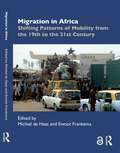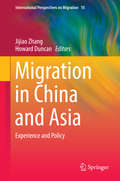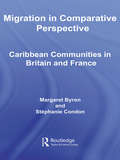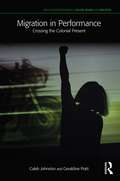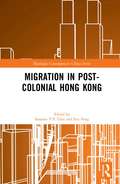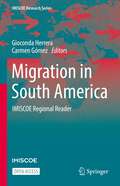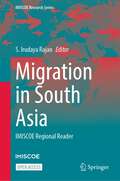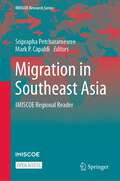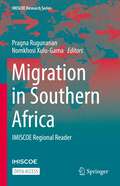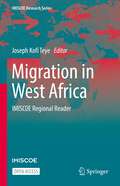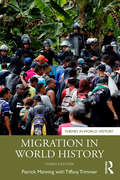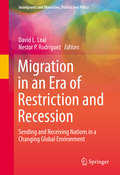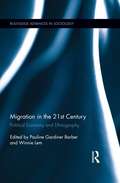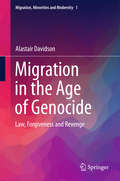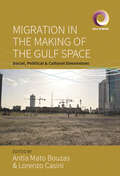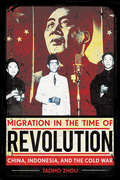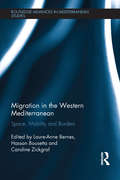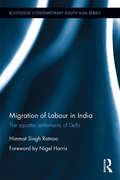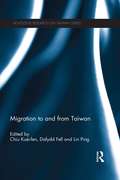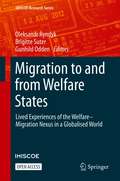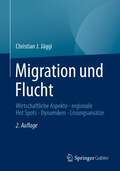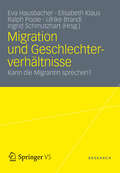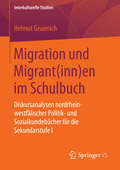- Table View
- List View
Migration in Africa: Shifting Patterns of Mobility from the 19th to the 21st Century
by Michiel De HaasThis book introduces readers to the age of intra-African migration, a period from the mid-19th century onward in which the center of gravity of African migration moved decisively inward. Most books tend to zoom in on Africa’s external migration during the earlier intercontinental slave trades and the more recent outmigration to the Global North, but this book argues that migration within the continent has been far more central to the lives of Africans over the course of the last two centuries. The book demonstrates that only by taking a broad historical and continent-wide perspective can we understand the distinctions between the more immediate drivers of migration and deeper patterns of change over time. During the 19th century Africa’s external slave trades gradually declined, whilst Africa’s expanding commodity export sectors drew in domestic labor. This led to an era of heightened mobility within the region, marked by rapidly rising and vanishing migratory flows, increasingly diversified landscapes of migration systems, and profound long-term shifts in the wider patterns of migration. This era of inward-focused mobility reduced with a resurgence of outmigration after 1960, when Africans became more deliberate in search of extra-continental destinations, with new diaspora communities emerging specifically in the Global North. Broad ranging in its temporal, spatial, and thematic coverage, this book provides students and researchers with the perfect introduction to age of intra-African migration.
Migration in China and Asia
by Jijiao Zhang Howard DuncanThis book will enlarge our grasp of global migration phenomena, offering insights into the fascinating, at times startling, realities of human migration in Asia. The chapters presented in this volume offer variety in not only theme but in approach to migration in Southeast and East Asia. Particularly welcome for a volume on migration studies, a discipline that has long been dominated by economists, sociologists, and geographers, are the chapters that approach the subject from an anthropological or ethnological perspective. These chapters bring to our attention details of the lives of migrants and their communities that are often lost in studies of migration statistics, the economic aspects of migration, or aspects of urban geography with which we have become more familiar. Some chapters are more theoretical in nature and herein lie some of the most important reasons for studying migration involving Asian countries: migration studies have, until relatively recently, developed their theoretical insights on the basis of European migration to North America. Asian migration offers new theoretical challenges to migration scholars; its dynamism is such that predictions of what is to come are not for the risk averse. The empirical studies here provide fascinating details of the strategies used by asylum seekers, of marriage migration, of the role of homeland languages in education, of the workings of ethnic entrepreneurs, of the media's role in sustaining Chinese communities, and on the incentive structures that are helping to shape return flows to China. For readers who are from Asian countries, this book will illuminate the changes that are taking place in your region as a result of migration. For readers from developed and other societies, it will provide new insights into migration involving this understudied part of the world, an area that supplies the lion's share of immigrants to developed economies, and the area whose rapid economic development will soon make it their greatest competition for migrants, especially the highly skilled.
Migration in Comparative Perspective: Caribbean Communities in Britain and France (Routledge Research in Population and Migration)
by Margaret Byron Stéphanie CondonThis book presents a comparative perspective on post-war Caribbean migration to Britain and France. Both migrations were responses to the link between former colonies and colonial powers. However, the movements of labor occurred within separately and differently evolving political contexts, affecting the migration outcomes. Today, Caribbean communities in Europe display complex features of continuity and change. Condon and Byron examine trends in migration patterns, household and family structures, social fields, employment and housing trajectories in detail. This systematic comparison with its innovative focus on gender and life-course, is an excellent addition to the existing literature on the Caribbean diaspora.
Migration in Performance: Crossing the Colonial Present (Routledge Research in Place, Space and Politics)
by Geraldine Pratt Caleb JohnstonThis book follows the travels of Nanay, a testimonial theatre play developed from research with migrant domestic workers in Canada, as it was recreated and restaged in different places around the globe. This work examines how Canadian migration policy is embedded across and within histories of colonialism in the Philippines and settler colonialism in Canada. Translations between scholarship and performance – and between Canada and the Philippines – became more uneasy as the play travelled internationally, raising pressing questions of how decolonial collaborations might take shape in practice. This book examines the strengths and limits of existing framings of Filipina migration and offers rich ideas of how care – the care of children and elderly and each other – might be rethought in radically new ways within less violently unequal relations that span different colonial histories and complex triangulations of racialised migrants, settlers and Indigenous peoples. This book is a journey towards a new way of doing and performing research and theory. It is part of a growing interdisciplinary exchange between the performing arts and social sciences and will appeal to researchers and students within human geography and performance studies, and those working on migration, colonialisms, documentary theatre and social reproduction.
Migration in Post-Colonial Hong Kong (Routledge Contemporary China Series)
by Susanne Y.P. Choi Eric FongSince 1995 most mainland migrants to Hong Kong have been the wives or non-adult children of Hong Kong men of lower socio-economic status. The majority of immigrants are women, who throughout the past two decades have accounted for more than 60% of immigration. The profile of immigrants has been changing and they are significantly more educated than was the case in the past. Despite the improvement in the educational level of mainland Chinese migrants since 1991, and their increased involvement in paid employment, migrants have continued to experience great difficulty integrating into Hong Kong society and anti-immigrant sentiment seems to have increased over the same period. This raises the question of how gender and socio-economic factors intersect with migration to influence the extent of migrants’ adaption to Hong Kong society and culture. The growing anti-China sentiment in Hong Kong also raises the question of how the integration of migrants into a destination society is influenced by the political context. Examining the questions around migration into Hong Kong from a range of multidisciplinary perspectives, this book combines quantitative and qualitative data to portray a detailed image of contemporary Hong Kong.
Migration in South America: IMISCOE Regional Reader (IMISCOE Research Series)
by Gioconda Herrera Carmen GómezThis open access regional reader examines emerging issues around new migration patterns in South America and their relationship with changing migration policies over the last twenty years. The first part of the book looks at conceptual discussions on mixed and survival migration, the link between migration and extractivism, and the specific character of transit migration. A second part examines how these debates have led to transformations in state policies, and the shift in government policies from a human rights-based approach towards more restrictive ones. Finally, the third section revisits the relationship between racism, xenophobia and colonialism in contemporary migrations. As such this book makes an interesting read to students, academics, policy makers and all those working in the field.
Migration in South Asia: IMISCOE Regional Reader (IMISCOE Research Series)
by S. Irudaya RajanThis open access Regional Reader provides a contemporary look at the emerging challenges and issues facing South Asian migration amidst covid-19 and discusses a framework for a sustainable and cooperative migration from and within the region, which will impact both the economic and regional development of South Asia. The book draws a focus on this area through an interdisciplinary and holistic lens and follows the three broad areas of migration studies in South Asia: Governance and mobility, Family, health and demography, and Forced migration. It thereby covers a number of issues from South Asian countries such as Afghanistan, Bangladesh, Bhutan, India, Nepal, Pakistan and the Maldives. This book is a valuable resource for those who want to understand the dynamics of migration from the largest migrant-sending region in the world and one which will determine the shape of global migration patterns in the future.
Migration in Southeast Asia: IMISCOE Regional Reader (IMISCOE Research Series)
by Sriprapha Petcharamesree Mark P. CapaldiThis open access IMISCOE Regional Reader explores the issues faced by migrant groups in Southeast Asia and the challenges of getting of their human rights recognized. It analyses the different responses, or lack thereof, of the Association of Southeast Asian Nations (ASEAN) to these highly complex situations which are shaped by contemporary debates around borders and concepts of states, migrants’ rights as well as access to citizenship and how these concepts and paradigms are intertwined with issues such as agency and resilience of migrants. Crucial attention is given to the region’s lesser known populations and issues such as the Vietnamese in Thailand, people of Indonesian descent (PIDs) in Southern Philippines, independent child migrants across the region, and the vulnerabilities of migrant workers facing the COVID-19 pandemic. With its unique regional focus, this book provides a valuable resource to those studying human rights and migration issues, policy makers and researchers and students.
Migration in Southern Africa: IMISCOE Regional Reader (IMISCOE Research Series)
by Pragna Rugunanan Nomkhosi Xulu-GamaThis open access Regional Reader proposes new ways of theorizing migration in Southern Africa by arguing that traditional western forms of theorizing do not adequately fit the South-South migration context. It explores the existing definitions of a ‘migrant’ with a view to conceptualise a definition which will speak to the complexities, envisioning a more inclusive Southern African region. The book investigates the various levels of migration moving from the local (rural to urban and urban to rural) to cross border migration; middle-class versus working-class migrant household livelihoods; livelihoods procurement versus wage earning; social capital (networks) and how they make meaning of their circumstances in a ‘foreign’ space. It also acknowledges the intertwined issues of gender and class as important in analyzing migration processes and the chapters feature both in varying dimensions. As such, the book provides a great resource for students, academics and policy makers.
Migration in West Africa: IMISCOE Regional Reader (IMISCOE Research Series)
by Joseph Kofi TeyeThis open access Regional Reader examines the dynamics and impacts of international migration within and from West Africa. The book presents key theoretical perspectives and empirical findings on historical trends, geographical patterns, drivers and socio-economic impacts of both voluntary and involuntary migration in West Africa, a region that is characterised by high level of mixed migration flows. The book is divided into three main parts: changing patterns and governance of migration, managing environmental and forced migration, and diaspora, transnationalism and development. The chapters raise key research questions and outline recommendations for improving migration governance, protecting migrants and harnessing the benefits of migration for socio-economic development for both countries of origin and destination of migrants. As such this Regional Reader provides an interesting read to students, academics, researchers, migration experts, development practitioners and policy makers.
Migration in World History (Themes in World History)
by Patrick Manning Tiffany TrimmerIn this third edition of Migration in World History, Patrick Manning presents an expanded and newly coherent view of migratory processes, conveying new research and interpretation. The engaging narrative shows the continuity of migratory processes from the time of foragers who settled the earth to farmers opening new fields and merchants linking purchasers everywhere. In the last thousand years, accumulation of wealth brought capitalism, industry, and the travels of free and slave migrants. In a contest of civilizational hierarchy and movements of emancipation, nations arose to replace empires, although conflicts within nations expelled refugees. The future of migration is now a serious concern. The new edition includes: An introduction to the migration theories that explain the shifting patterns of migration in early and recent times Quantification of changes in migration, including international migration, domestic urbanization, and growing refugee movements A new chapter tracing twenty-first-century migration and population from 2000 to 2050, showing how migrants escaping climate change will steadily outnumber refugees from other social conflicts While migration is often stressful, it contributes to diversity, exchanges, new perspectives, and innovations. This comprehensive and up-to-date view of migration will stimulate readers with interests in many fields.
Migration in an Era of Restriction and Recession
by David L. Leal Nestor P. RodríguezWe live in an age of global migration. The number of immigrants worldwide is large and growing. At the same time, public and political reactions against immigrants have grown in the US, the UK, Canada, and other traditional and non-traditional receiving nations. In response to this trend, this book assembles an interdisciplinary group of scholars to better understand two dimensions of contemporary immigration policy - a growing enforcement and restriction regime in receiving nations, and the subsequent effects on sending nations. It begins with three background chapters on immigration politics and policies in the United States, Europe, and Mexico. This is followed by eleven chapters about specific receiving and sending nations - four for the United States, three for Europe, and four for the sending nations of Mexico, Turkey, Peru, and Poland. This selection of cases and the multidisciplinary approach provides a unique perspective that supplements more standard case studies and disciplinary research. By discussing a greater range of nations and topics--the global consequences of increased deportations, stronger border security, greater travel restrictions, stagnant economies, and the loss of remittances--this volume fills a significant gap in the current body of literature. As such, this book is of interest to immigration policy scholars and students of all levels as well as individuals in think tanks, advocacy communities, the media, and governments.
Migration in the 21st Century: Political Economy and Ethnography (Routledge Advances in Sociology)
by Winnie Lem Pauline Gardiner BarberThis edited collection focuses on global migration in its inter-regional, international and transnational variants, and argues that contemporary migration scholarship is significantly advanced both within anthropology and beyond it when ethnography is theoretically engaged to grapple with the social consequences and asymmetries of twenty-first century capitalism’s global modalities. Drawn from settings across the globe, case studies explore the nuanced formations of class and power within particular migration flows while addressing the complex analytics of a contemporary critical political economy of migration. Subjects include global migrants as capitalists, entrepreneurs and "cosmopolitans," as well as workers and immigrants who are subject to varying degrees of precariousness under intensified competition for profits within contemporary global economies. By re-addressing the question of the relationship between changes in global capitalism and migration, the book aims for a timely intervention into the debates on migration which have come to be one of the most contentious emotionally fraught issues in North America and Europe.
Migration in the Age of Genocide
by Alastair DavidsonThis book presents a novel proposal for establishing justice and social harmony in the aftermath of genocide. It argues that justice should be determined by the victims of genocide rather than a detached legal system, since such a form of justice is more consistent with a socially grounded ethics, with a democracy that privileges citizen decision-making, and with human rights. The book covers the Holocaust; genocides in Argentina, South Africa, Rwanda, Latin America, and Australia, as well as crimes against humanity in Italy and France. From show trials to state- enforced forgiveness, the book examines various methods that have been used since 1945 to punish the individuals and groups responsible for genocide and how they have ultimately failed to deliver true justice to the victims. The only way to end this failure, the book points out, is to return justice to the victims. This simple proposition; however, challenges the Enlightenment tradition of Western law which was built on the refusal to allow victims to determine the measure of justice. That would amount, according to Bacon, Hegel, and Kant to a revenge system and bring social chaos. But, as this book points out, forgiveness is only something victims can give, no-one can demand it. In order to establish a lasting peace, it is necessary to re-examine the philosophical and theoretical refusal to return justice to the victims. The engaging argument put forth in this book can help deliver true justice and re-establish international social harmony in the aftermath of genocide. Genocide is ubiquitous in the modern, global world. It's understanding is highly relevant for the understanding of specific and perpetuating challenges in migration. Genocide forces the migration of millions to avoid crimes against humanity. When they flee war zones they bring their fears, hates, and misery with them. So migration research must engage fully with the experience of genocide, its human conseque nces and the ethical dilemmas it poses to all societies. Not to do so, will make it more difficult to understand and live with newcomers and to achieve some sort of harmony in host countries, as well as those which are centers of genocide.
Migration in the Making of the Gulf Space: Social, Political, and Cultural Dimensions (Worlds in Motion #11)
by Lorenzo Casini Antía Mato BouzasCombining visual and literary analyses and original ethnographic studies as part of a more general political reflection, Migration in the Making of Gulf Space examines the role of migrants and non-citizens in the processes of settling in the Arab States of the Gulf region. The contributions underscore the aspirational character of the Gulf as a place where migrant recognition can be attained while also reflecting on practices of exclusion. The book is the result of an interdisciplinary dialogue among scholars and includes an original contribution by the acclaimed author of the novel Temporary People, Deepak Unnikrishnan.
Migration in the Making of the Gulf Space: Social, Political, and Cultural Dimensions (Worlds in Motion #11)
by Lorenzo Casini Antía Mato BouzasCombining visual and literary analyses and original ethnographic studies as part of a more general political reflection, Migration in the Making of Gulf Space examines the role of migrants and non-citizens in the processes of settling in the Arab States of the Gulf region. The contributions underscore the aspirational character of the Gulf as a place where migrant recognition can be attained while also reflecting on practices of exclusion. The book is the result of an interdisciplinary dialogue among scholars and includes an original contribution by the acclaimed author of the novel Temporary People, Deepak Unnikrishnan.
Migration in the Mediterranean
by Ippolito, Francesca and Trevisanut, Seline Francesca Ippolito Seline TrevisanutMediterranean states have developed various cooperation mechanisms in order to cope with the issues that arise from migration. This book critically analyses how institutional actors act and interact on the international scene in the control and management of migration in the Mediterranean. It highlights how, even though the involvement of 'universal' international organisations guarantees a certain balance in setting the goals of cooperation mechanisms and buttresses a certain coherence of the actions, the protection of migrants' fundamental rights is still an objective as opposed to a reality, and security imperatives and trends still prevail in the aftermath of the 2011 Arab Spring.
Migration in the Time of Revolution: China, Indonesia, and the Cold War
by Taomo ZhouMigration in the Time of Revolution examines how two of the world's most populous countries interacted between 1945 and 1967, when the concept of citizenship was contested, political loyalty was in question, identity was fluid, and the boundaries of political mobilization were blurred. Taomo Zhou asks probing questions of this important period in the histories of the People's Republic of China and Indonesia. What was it like to be a youth in search of an ancestral homeland that one had never set foot in, or an economic refugee whose expertise in private business became undesirable in one's new home in the socialist state? What ideological beliefs or practical calculations motivated individuals to commit to one particular nationality while forsaking another?As Zhou demonstrates, the answers to such questions about "ordinary" migrants are crucial to a deeper understanding of diplomatic relations between the two countries. Through newly declassified documents from the Chinese Foreign Ministry Archives and oral history interviews, Migration in the Time of Revolution argues that migration and the political activism of the ethnic Chinese in Indonesia were important historical forces in the making of governmental relations between Beijing and Jakarta after World War II. Zhou highlights the agency and autonomy of individuals whose life experiences were shaped by but also helped shape the trajectory of bilateral diplomacy. These ethnic Chinese migrants and settlers were, Zhou contends, not passively acted upon but actively responding to the developing events of the Cold War. This book bridges the fields of diplomatic history and migration studies by reconstructing the Cold War in Asia as social processes from the ground up.
Migration in the Western Mediterranean: Space, Mobility and Borders (Routledge Advances in Mediterranean Studies)
by Edited by Laure-Anne Bernes, Hassan Bousetta and Caroline ZickgrafThe upheavals of the Arab Spring grabbed the world’s immediate attention, and concern quickly grew over their potential aftermath, with the fear that a ‘tidal wave’ of immigrants and refugees would ‘flood’ European territory. The Arab Spring has highlighted the Mediterranean as a migration region, and new research is now required to bring to light too often neglected mobility patterns and border practices that predate and outlast the tumultuous spring of 2011. The edited volume Space, Mobility and Borders in the Western Mediterranean tackles these contemporary issues related to migration in the Mediterranean region. It brings together high-quality, original academic contributions from both empirical and theoretical points of view by scholars from diverse disciplines, who draw upon Anglophone, Francophone, Spanish and Italian research. It reexamines borders in the light of a now full-blown body of literature that seeks to capture the complexity of their contemporary features beyond their most direct visual enactments, in particular the sweeping deployment of policing devices and operations along the North/South fault line. Another distinctive binding thread in this book is that it emphasizes migrants as active subjects interacting with local events, national policies and the bordering process. Offering an examination of the intricate interplay among the events of the Arab Spring, migration’s multiple types and actors, and the evolving relationship between migration control and borders in the region, this book is an essential resource for students and scholars of migration studies, European Union Studies and Mediterranean Studies.
Migration of Labour in India: The squatter settlements of Delhi (Routledge Contemporary South Asia Series)
by Himmat Singh RatnooMigration – both within and between countries – is increasingly one of the world's most important policy issues. The faster the Indian economy grows, the larger will be the geographical redistribution of the workforce from localities of low to those of high employment growth. Thus, territorial mobility is fundamental both to realizing the full economic potential of India's people and to allowing the population to escape from rural poverty. The book analyses the decisive factors in labour migration. Based upon a thorough and robust examination of migrants to three slum localities of Delhi stretching over four decades, the author examines why people migrate, the circumstances of their decision and their experience at their destination. He investigates the myths of urban policy – that "rural development" will reduce migration to the cities, that "growth poles" can be created to divert migrant flows, and that government has the power to influence significantly migration scales and directions while pursuing essentially unpredictable market-driven economic growth. Testing the essential theoretical basis for urban policy in India, the book is of interest to academics studying migration of labour and urbanization, and those interested in South Asian Studies.
Migration to and From Taiwan (Routledge Research on Taiwan Series)
by Dafydd Fell Chiu Kuei-Fen Lin PingMigration has transformed Taiwanese society in the last 20 years. The main inflows have been temporary workers from Southeast Asian countries and female spouses from Southeast Asia and China marrying Taiwanese husbands. The main outflow has been migration to China, as a result of increased economic integration across the Taiwan Strait. These changes have significantly altered Taiwan’s ethnic structure and have profound social and political implications for this new democracy. As large numbers of these migrants take Taiwanese citizenship and their offspring gain voting rights, the impact of these "new Taiwanese" will continue to increase. This book showcases some of the leading researchers working on migration to and from Taiwan. The chapters approach migration from a range of disciplinary perspectives, including international relations, sociology, social work, film studies, political science, gender studies, geography and political economy and so the book has great appeal to scholars and students interested in the politics of Taiwan, Taiwanese society and ethnic identity as well as those focusing on migration in East Asia and comparative migration studies.
Migration to and from Welfare States: Lived Experiences of the Welfare–Migration Nexus in a Globalised World (IMISCOE Research Series)
by Brigitte Suter Oleksandr Ryndyk Gunhild OddenThis open access book explores the role of family, public, market and third sector welfare provision for individual and households’ decisions regarding geographical mobility. It challenges the state-centred approach in research on welfare and migration by emphasising migrants’ own reflections and experiences. It asks whether and in which ways different welfare concerns are part of migrants’ decisions regarding (or aspirations for) mobility. Employing a transnational and a translocal perspective, the book addresses different forms of geographical mobility, such as immigration, emigration, and re-migration, circular and return migration. By bringing in empirical findings from across a variety of Western and non-Western contexts, the book challenges the Eurocentric focus in current debates and contributes to a more nuanced and more integrated global account of the welfare-migration nexus.
Migration und Flucht: Wirtschaftliche Aspekte - regionale Hot Spots - Dynamiken - Lösungsansätze
by Christian J. JäggiDieses Fachbuch ordnet die hochaktuelle Fluchtthematik in größere theoretische Zusammenhänge ein. Dabei werden die wichtigsten globalen Fluchtbewegungen und Migrationsrouten und regionale Hot Spots skizziert, und zwar aus europäischer und insbesondere aus schweizerischer Sicht. Für Migration und Flucht gibt es ökonomische Ursachen, aber auch Krieg, Gewalt und Naturkatastrophen führen dazu, dass eine wachsende Zahl von Menschen ihre Heimat verlässt. Neben Fragen des Überlebens sind oft auch der Wunsch nach einem besseren Leben die Motivation dazu. Im Gegensatz zu früheren Darstellungen der Migrationsforschung geht der Schweizer Autor Christian J. Jäggi nicht von linearen Migrationsverläufen, sondern von gleichzeitigen, bilokalen Lebensformen aus. Die ökonomischen Implikationen von Migration und Flucht sowohl für die Migranten als auch für die Herkunfts- und für die Einwanderungsländer werden dargestellt. Zudem werden internationale und globale Strategien und Lösungsansätze analysiert.
Migration und Geschlechterverhältnisse
by Elisabeth Klaus Ingrid Schmutzhart Ulrike Brandl Ralph J. Poole Eva Hausbacher"Can the subaltern speak?" fragt Gayatri Spivak in einem der Schlüsseltexte postkolonialer Theorie. Ihre Antwort darauf ist wenig optimistisch: Die "fremde" Frau bleibe immer lediglich Repräsentierte und besitze als diese "Andere" keine Stimme. Die AutorInnen untersuchen das Phänomen der Migration in seinen geschlechtsspezifischen Zusammenhängen aus interdisziplinärer Perspektive. Sie diskutieren die vielfältigen Verschränkungen von kultureller Differenz und Geschlechterdifferenz. Dabei werden Fragen der Intersektionalität ebenso beleuchtet wie die Entwicklung von multi- über inter- zu transkulturellen Perspektiven und die vielfältigen Zusammenhänge von Mobilität und Gender.
Migration und Migrant(inn)en im Schulbuch
by Helmut GeuenichSchulbücher filtern - wie andere Massenmedien auch - Informationen über Gesellschaft und Politik. Sie erreichen über die Schule und den Unterricht Kinder und Jugendliche in großer Zahl und beeinflussen das Bewusstsein vieler Menschen. Insofern kann eine Analyse der Darstellung von Migration und Migrant(inn)en in Schulbüchern einen wichtigen Beitrag zur Erklärung der Einstellung vieler Bundesbürger zu entsprechenden Themen leisten. Eine derartige Untersuchung erscheint auch deshalb von Bedeutung, weil Schulbücher in dieser Hinsicht im Unterschied zu anderen Medien (Fernsehen / Zeitungen) selten, für Nordrhein-Westfalen noch nie, wissenschaftlich erforscht wurden.
